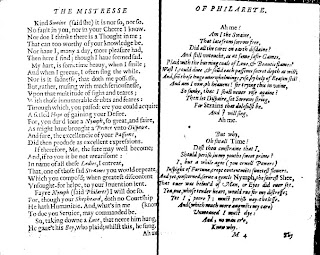

I always meant to do a posting on this piece of 17th century concrete poetry by George Wither: John Broadbent included the second stanza in his Signet Classic Poets of the 17th Century. (Volume two, with its marvellous selection of the minor writers complementing the canonists in volume one.) It appears there as 'from Rhomboidal dirge' - that terrific title was all I could remember, and I just could not find the poem anywhere on LION or EEBO.
I just loved the idea of a 'rhomboidal dirge', and could feel myself ready to discourse about Herbert's 'Church Floor':
Mark you the floore? that square & speckled stone
Which looks so firm and strong,
Is Patience:
And th'other black and grave, wherewith each one
Is checker'd all along,
Humilitie...
and the suitable solemnity of a dirge in rhomboidal stanzas...
Ah, but: it is no such thing - when one finally noses out this potential truffle, it proves a rotten puff-ball; the inspiration was all editorial: Wither, reliably witless, actually deploys his poem-for-the-eye as a lute song trolled off by a lover, completely losing the point, and Broadbent anyway used the best stanza.
So I must mourn my 'rhomboidal dirge' - there was never a poem of that title. And not once did George Wither put two words together so well: that rare grace note came from his editor.
It is a 17th century word, though: one of Sir Thomas Browne's fine pomposities: In the Garden of Cyrus (1658): "Perspective pictures, in their Base, horison, and lines of distances, cannot escape these Rhomboidall decussations"
- the good doctor got two select words together there. The OED has him as first actually to dare use that bit of pure inkhorn (for 'criss-crossways'), and also finds a moment to correct, with majestic patience, another writer's three hundred year old mistake:
This Browne scrap from the great feast of language must be our sole reward, for the poem does not live up to the excitement of its shape. Something which is probably true of most concrete verse.

2 comments:
Thanks for the info. Have you come across any of the following:
http://www.bartleby.com/
http://www.plagiarist.com/
http://www.completeclassics.com/
http://www.luminarium.org/lumina.htm
http://www.poemhunter.com/
http://www.poetry-archive.com/
http://www.poems.com/
http://www.tonykline.co.uk/
http://www.poemtree.com/
These are where I do some of my reading. Just thought they might be of interest/use.
Some familar, some not, I must cut-and-paste those I don't know and give them a whirl. I'm contemplating typing out G Manley-Hopkins's 'Il Mystico' for a post on poems after L'Allegro and Il Penseroso (I've a link to the text of that 'Il Moderato' which Handel set). If I can get it from somewhere else, I'd be glad to skip the typing. Questia has a complete text of GMH, but I don't know that I want to sign up with them.
Post a Comment